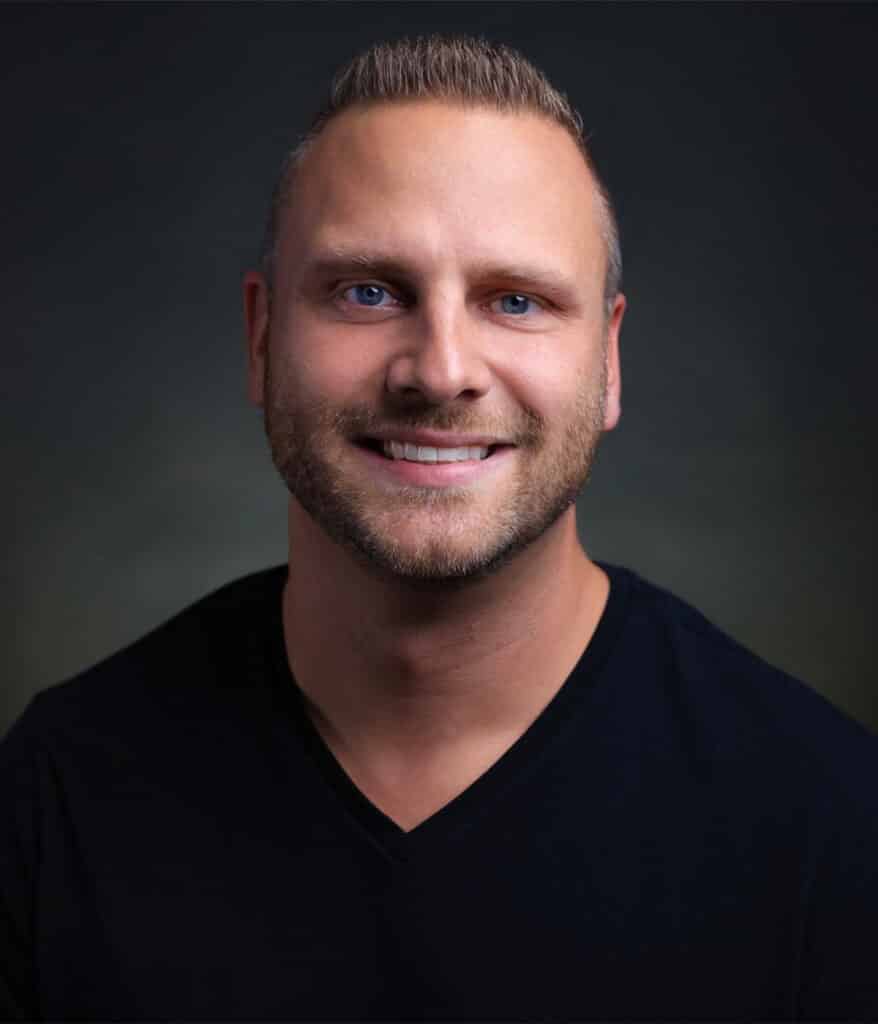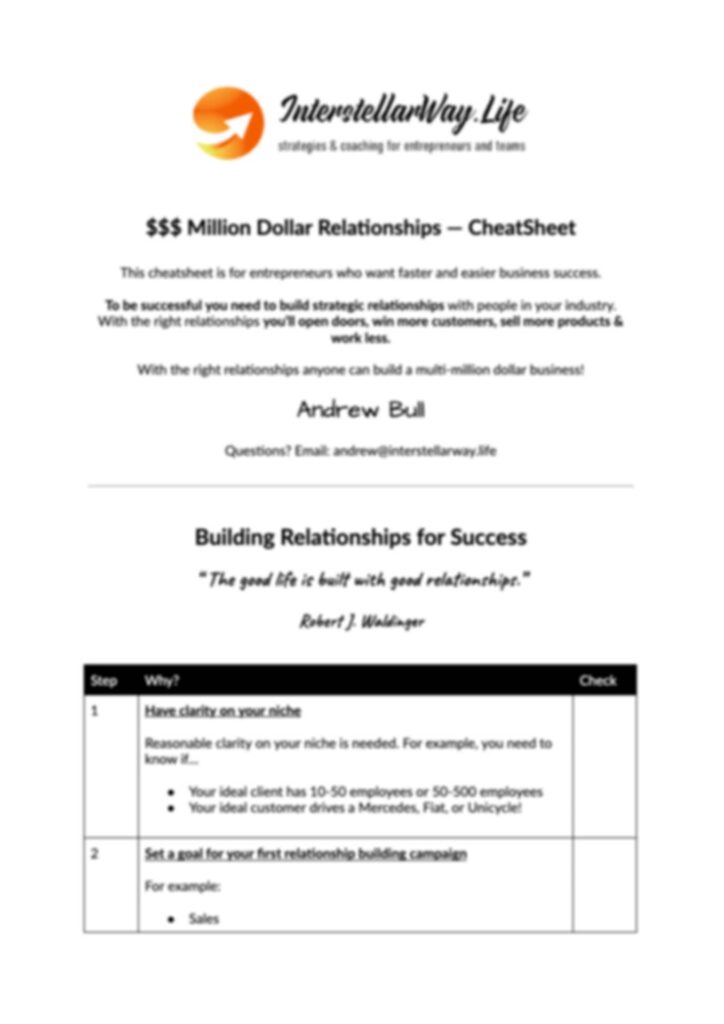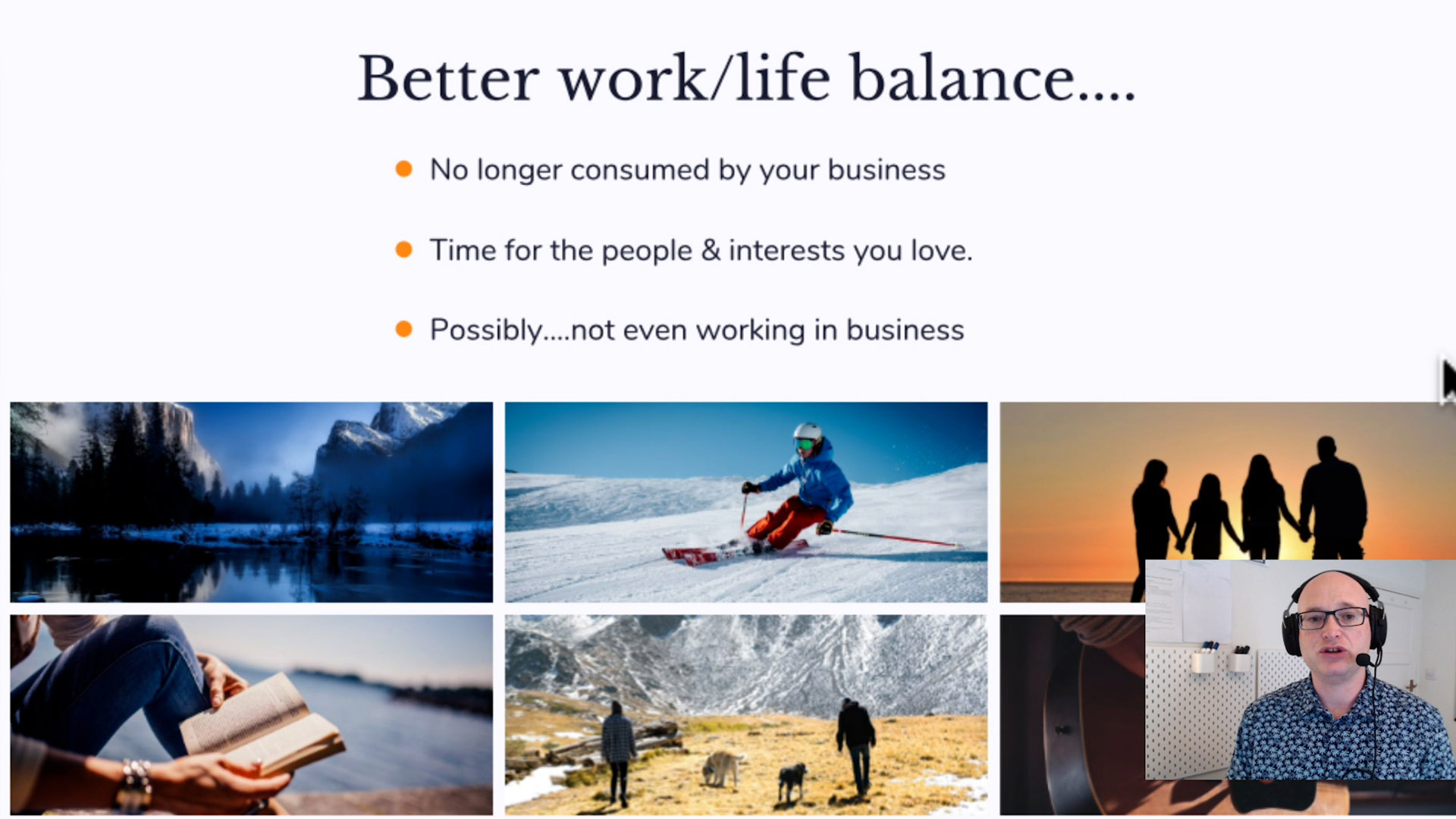Interstellar Business Show
Podcast for Technology CEOs and their teams.
It's time to grow your mind, elevate performance, and own your future 🚀

Interstellar Business Show
Episode: 0033
0033 - Matt Mersino on Leadership Amplification
Featuring....
Episode Introduction
Can you relate to this?…
You know that being a strong leader is important.
You know that strong leaders…
- Are positive role models for their team
- Can powerfully influence the direction of their team
But… you don’t know if you’re doing it right.
You don’t know if you’re truly tapping into your leadership potential.
If you have these thoughts and concerns… you’re not alone.
Many leaders do.
But here’s the good news…
Today, Andrew is joined by an expert who’s going to help you become a next-level leader….
In today’s show you will learn:
- How to turbocharge your leadership abilities
- How to sidestep mistakes that leaders make
- How to amplify your leadership
- Lastly, you’ll get actionable steps for becoming a powerful leader.
Listen now.
Episode notes & resources
Find out more about Matt Mersino
Connect with Matt on https://www.mattmersino.com/
Get Matt’s book here: https://www.mattmersino.com/book
Love this podcast episode? Please leave a review here
Listen to more episodes here: Interstellar.Show
Get Andrew’s free Resources for Leaders with teams → https://bit.ly/2Ygyoij
Join Andrew’s Interstellar Community → https://interstellarway.life/sign-up-for-newsletter/
Transcript
Please note, this transcription is autogenerated, so there may be errors.
[00:00:00]
Can you relate to this? You know, that being a strong leader is important. You know that strong leaders are positive role models for their team can powerfully influence the direction of their team. And help their business achieve goals faster.
But perhaps you’re not sure if you’re doing it right. You don’t know if you’re truly tapping into your leadership potential. If you have these thoughts and concerns , you’re not alone. Many leaders do.
But here’s the good news. Today, I’m joined by an expert. Who’s going to help you become a next level leader.
In today’s show, you will learn how to turbocharge your leadership abilities, how to sidestep mistakes that many leaders make. How to amplify your leadership. Lastly, you’ll get actionable steps for becoming a powerful leader.[00:01:00]
Now, before we meet today’s guests, I just want to quickly tell you about my book, which is called monsters of team performance. You can find it on Amazon introduces eight hideous monsters, which dragged down a team’s motivation productivity. Cohesion innovation and things like the ability to attract and retain the right talent in your business. If these are things that you want to improve in your business, you should grab a copy of my brand new book called monsters of team performance, which is available on Amazon.
Now before we get started, please make sure you subscribe and follow us wherever you’re listening today. So you never miss an episode again.
so we’re live on the Intertel business show and I’m very pleased today to be joined by Matt Massino, who is an author, speaker and [00:02:00] inspirational business leader from smuggling Bibles into hostile countries to working in the fast paced tech world as a C-suite executive to speaking coaching and training leaders.
Matt is on a mission to. Others achieve their goals by elevating their leadership and their impact. How did I do Matt with your introduction?
That was great. You made me sound great. thank you for that. I’m glad to be here.
You are welcome. Yeah, it’s good to have you here today, then let’s move swiftly forward into this first part of the show, which is called. Have courage.
So, Matt, what secret don’t people know about you?
Sure, great question.. I was thinking a little bit about this and what I wanted to share and something I’ve not shared much of publicly, and I’m, I’m going to start as it relates to my story is that I went broke twice by the time I was [00:03:00] 30 years old and not many people know that. And I remember what it was like being a dad.
Staring into the back of empty cupboards, wondering what I’m gonna feed the kids. I remember what it was like to have water cut off power cut off and how scary that was on more than one occasion. And you know, I found through those experiences years ago that you know, some of the greatest strengths.
That would serve me later on in life in business, in parenting marriage really E everywhere. A lot of those great strengths came from those, those challenges and those seasons of, of a little bit of suffering, if you will. So that’s, that’s not something I’ve shared a whole lot about, but you know, I think as, as a business leader as well and for those who are entrepreneurs You know, it can be, it can be tough, especially in the early days.
And the level of sacrifice can be very high. And so for those listening, keep going you know, don’t lose heart, know that those challenges you’re [00:04:00] facing now or the challenges to come are really gonna serve you well and build strengths that you know, nothing else are build things that nothing else could, other than those, those challenges and those seasons of suffer.
Well, that’s an awesome piece of advice. And I guess those kind of challenges do. Found you as well, right?
for sure. Yeah, absolutely. Absolutely.
So what’s your origin story? How did you actually start off and go on this journey into leadership?
So I grew up in small town, Northern Michigan, and graduated high school, went off to the university of Michigan. And I was very fortunate early on as a college student to connect and network with other successful business leaders. Just kind of a friend of a friend, you know, you’re only one handshake away from a brand new life.
So I met some incredible people and I began to travel to. Different leadership conferences, networking events, that sort of thing, and got to rub shoulders with you know, these [00:05:00] multimillionaire successful business leaders. And I saw over time that it wasn’t always about, or the success wasn’t always about the money.
It wasn’t just about the big businesses. And a lot of the things you see, you know, the headlines and, you know, all the, all the, the PR and all of that. But. Some of these, these men and women were so grounded in their values, they had incredible integrity. It reminded me and showed me that the good guys do win.
Sometimes we forget that and to see people lead with integrity and with honor and with values it, it reminded me that how you win. Is just as important as winning itself. And so I spent some time journeying with these leaders. I spent some time working in, in a nonprofit setting ministry settings all throughout my twenties before becoming or before coming full circle, back to the business world as a sole focus in my late twenties.
And then. I spent some time in the finance space. Tech space worked my way into a C-suite executive role. And all [00:06:00] throughout those years, I was always gravitating toward the people side of business. And that’s just where I, I seemed to have the most fun. The most success could really bring the most value and make the greatest impact.
And that naturally led into a desire to help other leaders to help aspiring leaders, to help current leaders overcome their challenges with teams. In business, personal growth, all of that, but I think I could tie it all back to those experiences I had in my late teens, early twenties working with these very successful people and seeing what it meant to be a great leader and to do it well.
That’s so awesome. And I love hearing about how you man, you managed to connect with these positive leadership role models. And it makes me think if you are not going on a journey, which is actually value driven, and it’s just about a result and maybe a financial driven journey, then you could end up in a big house on top of a hill.
but be very lonely with [00:07:00] no one else around you. You’re not taking anyone on that journey with you. So there is something to be said about the right without entrepreneurial journey.
Absolutely.
All right. Let’s move forward into the next area of the show, which is called the big idea.
And should I have said when you mentioned, Michigan before, should I have said go Wolverines? is that
Yes, absolutely. Yeah. You know, least you didn’t say go Buckeyes or go Spartans.
Okay. Alright, cool. Cool. Like I I know I know a little bit of my Okay. I’m glad I know a little bit about my American sports. All right, cool. So what is the big idea that you want to share with our tech leaders? What is the idea that they must know Matt?
Sure. So today it’s all about leadership amplification and this comes straight from my newest book. That’s about to release in the coming months, the [00:08:00] transformational leader, how four types of people change the world. And in the opening chapters of that book, I reveal the specific things. That leaders really need to focus on to amplify their leadership.
And leadership is, is not a new concept. There’s been, you know, millions of books written about it. It’s been a topic we’ve we’ve you know, thought about written about lectured about it’s, it’s nothing new especially as it relates to leadership definitions. Right. And I think one of the most succinct widely accepted definitions is, is John Maxwell’s, right?
Leadership has influenced nothing more, nothing less. And so no matter how you slice it, no matter how you look at the topic of leadership, it really all boils down to influence and how you influence other people. And so when you think about how to amplify your leadership, how to improve as a leader, what you’re really asking is how do I amplify my influence?
And so as, and I think as you talk to people about this, or as I’ve talked with other leaders about this, I’ve found that there’s a lot of ambiguity. [00:09:00] There’s a lot of question marks. There’s a lot of gray area, a lot of very vanilla, generalized type thinking and answers. I think a lot of people don’t know what to influence or, or, you know, specifically what to aim at, what are you influencing in another person?
Is it just their performance? Right. I think, you know, speaking in for, you know, in the business world, that’s, that’s always, you know, something that’s top of mind is how are we, how are we impacting a team’s performance? You know, if we’ve got a cross-functional team, how are we influencing this team’s performance?
And does that have a domino effect over here? Or, I mean, you can slice it, you know, a number of different ways. But it really all comes down to. What you’re influencing. And so as we get more granular with it and you start to unpack some of these concepts and I won’t go into all of this right now, I do in the book, but looking back on some great thinkers in the late seventies, mid eighties, who who unpacked this topic.
Called transformational leadership, which is basically influence at the highest [00:10:00] level. What is it that great leaders influence? What is it that sets them apart from average leaders who get average results? And what you’ll find is this, this is the whole, this is the one liner. This is where you want to write down the notes.
If you’re listening, remember this, the truest test of a leader’s influence is the fundamental shift in their follower’s desires. Motives and values, desires, motives, and values, what people want, why they want it and how it ties into what they believe. If you can shift. And I call it the DMV, right? Desires, motives, and values.
Not to be confused with that place. You go to renew your license plate or your driver’s license or whatever. you gotta sit there forever and wait. Not that DMV, different DMV, a much more
powerful DMV. maybe this is a leadership license that
yeah. Worth the weight too, worth the weight desires, motives and values. And [00:11:00] so the key then becomes how do you influence desires, motives, and values? How do you really. Bear weight against that in, in people’s lives, in, in a positive way. Because as you think about that on the surface, it’d be very easy to to have manipulative tactics or to do things that could influence what a person wants, why they want it and how they tie it, how it ties into what they believe in a way that really serves you and doesn’t necessarily serve another person.
And so there’s, there’s a bit of a fork in the road there. But at the end of the. If you want to amplify your leadership, if you’re looking to take it to the next level, you need to know where to lean in influence another person or another team’s desires, motives, and values.
That’s such a, a great insight. I haven’t heard it put that way before. So thanks for that. What problem do you think you’re, you’re really solving with this approach?
Yeah, I think overcoming the limitations [00:12:00] of weak influence or, or influence that hasn’t reached its highest potential. I think for those listening just listening to a podcast alone, really any podcast shows that you’re taking your own growth and development seriously. You don’t get to a position of leadership in business.
Maybe you’re a founder or a CEO. You don’t get there without already having some leadership and some influence. And so I think for a lot of people, it’s not necessarily just weak influence, but maybe influence that hasn’t been fully realized yet. Like, I, I know I’ve got so much more in me.
There’s so much. Further that I could go. There’s such a bigger impact I could be making. I just, I don’t know where to lean in and I think it’s very easy to start pulling Hey, let’s just read this random book or we’ll try this strategy or this tactic. But I think it’s, it’s critical to, to know with confidence where to spend the time and where to lean in the most and where to give your thinking [00:13:00] and, and your efforts to.
To get the highest ROI and to actually build yourself up into the type of person that can, can really make that impact on desire’s motives and values.
What are examples of poor influence, then like, let’s say we’ve got the wrong kind of leadership going on in an organization. What does that look like?
Yeah, that’s a great, great question. I think the worst is manipulative influence and so a person that uses their, their influence to serve themselves or to to lead without integrity. And I think another would be I’m just thinking about this, this value modeling component. I don’t want to jump too far ahead yet, cuz it’s something I wanna talk about in a few minutes, but I think if you go on social media today, really anywhere online and, and you look at the way go to a [00:14:00] common section and you can see how people think about their leaders, especially I’m thinking on, on LinkedIn or these areas that are maybe a bit more professional in nature and you can see people.
And COVID 19 revealed a lot of this as well. You can see people who are looking at their leaders. They know that the leaders are making good choices and yet people are still disappointed in the leader. They’re still frustrated with the leader. And this is really interesting. How is it that a person or a leader can make good choices can make, can make good decisions and, and put things into action that make a positive impact.
And yet people can still be. Disgruntled or upset and say things like, oh, well the leader’s only doing that because they know they have to, or that must have been like drink in vinegar. That must have been tough for them cuz we know that’s not what they really believe. You know, there’s, there’s a little bit of murmuring water cooler talk.
What is that really saying? I think this is, this is a widespread thing. It’s nothing new, but you know, COVID certainly revealed a lot more of that. A bit of this disgruntledness, a bit of this [00:15:00] distaste and frustration toward toward leaders in general. And what we find is that many times this is it right here.
Many times there is a gap between the leader’s actions and who the people know the leader to be. And when that gap exists, people feel it, they feel it because they know who the leader is. They know what they believe. They know, they know the patterns of thinking and behavior in that leader’s life. And even when good choices are made, sometimes there’s still frustration.
There’s still distrust. So I think closing that gap is, is key closing that gap and, and making who the leader is align. All of their thinking and behavior. That’s, that’s the key. That’s such a big thing. And, and we can talk more about that in.
Yeah. So, yeah. It’s interesting. What you say about social media revealing a lot of people’s. Set around leadership [00:16:00] and their positive or negative attitude to other leaders out there. And I suppose maybe if people aren’t strong enough or brave enough to, I mean, I’m not sure. Anyway, you should be speaking openly, critically about leadership.
The leadership in your own business, cuz I don’t think that’s a good thing to do anyway, cuz that’s kind of like gossiping. Right. But I suppose it’s quite interesting to understand how people think about leadership in general, because that probably is some kind of reflection. Of maybe how they think about leaders in your organization as well.
And maybe that’s some that that’s, maybe that’s a good exercise to, to follow follow for, you know, for our, for our leaders who are listening, follow a couple, other of other leaders on LinkedIn and, and try and understand how, how your people actually feel about leadership as well. What do you reckon? Does that sound like a good exercise for people?
Yeah. Yeah, absolutely. And I think that’s, you know, getting, getting a [00:17:00] temperature of the world around you getting a temperature of your own team. And doing it objectively, right. Being willing to be wrong, being willing to, to take the heat and to uncover the truth a little bit when it’s not always easy to, to see it or to hear it.
I think that’s, that’s the sign of a great leader as well. And the sign of a leader who’s, who’s continuing to grow and, and ready to grow. So I think any opportunity you can, you can take to get that tempera. Of your followers, right? The people that are looking to you to lead the people that are being influenced by you that feedback loop is critical and wherever you can find it and find it in a, in a clear and objective way is a good thing.
Yeah. And as, as actually only like 1% of people who have that really strong leadership mindset where they’re not only strong in voice and they’ve got an authority voice as a leader. But they’re also strong enough to question [00:18:00] reflect on their voice and their approach to things as well. That really shows true strength of leadership.
Right. I’ve got, I’ve got, another question for you then. So this idea the amplified leader and influence is this going against conventional thinking as well then?
Yeah, yeah, I think it does. And and the reason is this a lot of a lot of leadership. I guess teaching or training today is, is centered around things related to performance. And a lot of it’s good, you know, things like communication, teamwork, collaboration, I mean all the, all the basics, all the things that we know we’ve read about, we’ve heard about.
And, and they’re good to know, and they’re good to continuously grow in and brush up on and all of that. But what we’ll find is that, and that this is so true of the west today. [00:19:00] In that we are a hyper performance driven culture, right? And this is I’m gonna, I’m gonna poke the bear a little bit here because we are so obsessed with doing and with speed and busyness and, and tactics and strategies, and the next shiny thing that’s gonna help us to differentiate.
And some of these are good things, but leadership is such a paradox. Leadership is not performance, and it’s very easy to drag a hyper focus. Or, or on performance into a leadership mindset or into our, our personal development and growth as leaders. And what we’ll find is that. The difference between struggling leaders and successful leaders is less about what they do and more about who they have become.
This is, so this is so key because everything that you do ultimately flows from who you are, right. And from who you have become and who you are becoming. [00:20:00] And so I think. The leaders who take the approach of let’s try another tactic or a business strategy oftentimes experience perpetual frustration, or they don’t grow with the speed they know they could grow with and that they should grow with.
There’s just not a realization of the full potential. And the reason is they’re approaching it in the wrong way. They’re approaching it as, Hey, this is a, a tip, a tactic, a strategy, a business function, et cetera. When. It’s about the whole person and it’s about who a person is truly becoming. And then the question becomes, okay, well then who am I becoming?
Who do I need to become? Who should I become? Where should I, where should I spend my time and energy to become the right type of person and, and what can I ignore for right now? What can I put off until later? And that’s what the, the book, the transformational leadership outlines, it’s literally the, the framework of the four types of people that, that great leaders throughout history have focused on becoming.
And, who have differentiated themselves at the next level.
I think [00:21:00] that’s a really healthy perspective that you’ve outlined their map because you’re right. If we just focused on this binary kind of results driven approach to leadership. If I, if I speak to my team five times a week more, then I’ll get 20% more productivity. We are really looking at this whole area in a very base and shallow.
Which is not authentic and deep enough to drive those real results and transformation that we are looking for. So I think your, your idea, more holistic leadership, I guess, would it like makes a whole load of sense? Is that something that you’ve personally done yourself, then you’ve looked at developing yourself as an individual.
Absolutely. And a lot of this came and I know we probably don’t have the time to dive into it now, but a lot of this hit me pretty hard when I spent time overseas. And I was in dangerous situations. I [00:22:00] was way in over my head. I was with, you know, guys that were former military, you know, missionaries and, you know, amazing, amazing people who just, I mean, incredible folks and, and being over there and then meeting some of the leaders that were, that, that lived in these region.
Who have nothing. I mean, no money, no formal education, no technology. I mean, they have nothing and yet they’re leading thousands of people. It, it threw me off. I’m going, how in the world can a person create this level of impact and influence the. With, with next to nothing. And you know, here we are in the west today for probably for most of the people listening to this podcast and we’ve got access to just about anything we could ever need.
So where’s, where’s the, where’s the misstep like where’s the, where’s the barrier. Where’s why aren’t we at that next level? Why aren’t we having the impact as leaders that we want to have in our business and our teams, et C. And so and I know I’m, I’m going off on a, a bit of a, of a tangent there with [00:23:00] that, but I think it, it does come down to that holistic view in short.
And I, I fully understand as a, as a business leader myself, there are a lot of other things that, that are a priority. You know, we’ve got budgets to keep, we’ve got KPIs to hit. We’ve got, you know, thousand different things going on every single day. And so it can be a bit of a juggling act to. To take that you know, performance driven mindset and apply it to the right areas of business that need.
That absolutely need it. But then when it comes to the leadership side of things, make that shift and understand, Hey, this isn’t just about tips, tactics, and strategies. This is about people. This is about whole people. This is about me as a whole person. This is about individuals and, and how we’re living our life and doing life together.
On a daily basis. And when we see people in that way I, I think you know, we shift gears and really, really accelerate the ability to, to increase, influence, increase impact. Then of course, experience the business growth and, and hit the goals and all of those things that we want. But really those, those become [00:24:00] a byproduct of, of, you know, working together in teams and, and working together with that more holistic view.
Yeah, you’ve talked about some really big ideas there, Matt. And I think there is a thing about our cultural maturity here that maybe some of us are pushing up against because. We’re more aware and more accepting of these needs for holistic growth and overall growth to lift ourselves, our teams and our business.
But maybe there’s like a whole bunch of people who’ve got. Success, the old fashioned way, just from concentrating on the numbers. And so they don’t see that connection. Hopefully these things will change over time because ultimately things like money don’t guarantee you long term. Happiness. They bring sh they, they, you know, they’re necessary because they help you pay the bills, put a roof over your head, send your kids off to [00:25:00] college.
But after you’ve got all that base level of stuff in place, it’s not going to fulfill you and make you content. You actually need to be serving with purpose and integrity. As Matt says, Is there a trend that is demanding that our tech CEOs take action with this idea? Why, why now? Should they care? Because I like, in a way I’ve just outlined an, an opposite viewpoint of them being like, well, my business is working.
All right. Thank you very much, Matt. Why should I care about this style of leadership? Why should I take action now?
Yeah. Yeah. I think there is, there’s a huge gap in leadership today. We have a lot of average leaders and, and I think even, I think most people would, would agree with this. Even, even average leaders would agree and go, Hey, I know this is true. And and there’s very few who are. Really rising to the top and experiencing the type of [00:26:00] success that, that I think most of us want.
And I think that that gap is something that. People are now beginning to, to talk more openly about. And and in question, like how can I help? How can I become a part of the solution? Right? Like we can all just point to the problems. That’s easy to point out the problems, but I wanna step up. I, I wanna be a part of the solution.
I want to you step into higher levels of leadership and not just, you know, if you’re a CEO or a founder obviously from a positional standpoint, level, one type leadership stuff you’re already there. I know a lot of people and, and I, I have a lot of friends that are business owners that are Csuite executives in, in larger companies.
And the conversations that are had are not always about just becoming a leader for the sake of driving top line revenue. right. Because. We all know people who have made a lot of money, had a lot of success from a financial standpoint and they’re [00:27:00] miserable. They’re anxious, they’re depressed. They’re, they’re physically unhealthy, mentally unhealthy.
They, they’re not happy with their marriage. They’re not happy, you know, as, as a mom or as a dad. And it just eats at us. I mean, it just eats away at you. And so I think the conversation needs to continue evolving around. What does it mean to, to have success as a. Certainly financial can be a part of that, but there’s something more, there’s something bigger.
And this is, I touch on this toward the end of the book. It gets into something that’s purpose driven and, and missional and mindset and something that, yes, we’ll experience the, the team growth, the business growth, the financial growth, all of that. But those, then those are those become a byproduct, right?
They’re they’re not the, the direct focus. They’re just something wonderful that happens along the way. When we begin to elevate ourselves or elevate our influence and make a greater impact in the world around us. And then suddenly it’s not just about your business anymore. It’s not just about the impact you’re having there.
It’s not just about the impact you’re having with your team or on your [00:28:00] financial success. It’s about an impact that starts to really have a domino effect. And before, you know, it you’re influencing people that you never thought were even paying attention. You’re changing people’s lives in a way that you never thought that you could, or that wasn’t even on your radar.
And I would, I would tell most of the listeners, all the listeners today, there are people watching you. There are people that are paying attention to you and who are being impacted by you, and you don’t even know. You don’t even know they’re watching, you don’t know they’re looking and you don’t even know how much of a great impact you’re having in their life.
So all that to say, yes there’s a huge leadership gap and we need more men and women to step up to lean into the right ideas, the right type of strategies to focus on becoming the types of people that can make a positive impact.
Yeah, that’s so true. You, you, you are not always conscious of the impact you are having just the other day. Someone messaged me on LinkedIn and said, oh, [00:29:00] I love your podcast. My other podcast, which is about mindset. I love this episode you put up. And I think sometimes you feel like you’re in a bit of a vacuum, especially when it comes to online leadership.
And putting stuff out there and you’re like, how much is this actually resonate people. So yeah, you, you kind of have to stay positive and realize that you, that you are.
So Matt, we’ve got people excited about this amplified leadership or leadership amplification. can our CEOs take action with this big idea?
Yes. Great question. Let’s put the rubber to the road here, whatever leadership framework you look at out. Anything that’s been in the books, anything that’s talked about, anything you can Google search and find you’ll find a common denominator when it comes to the actionable component. And that is the first step to elevating your influence always has to do with modeling.
It’s some sort of modeling component. And what that simply means is you’ve gotta walk the talk, right? You’ve got to [00:30:00] walk the talk, but you’ve also gotta talk the walk. And what I mean by that is you you’ve gotta. Something in particular, you’ve gotta model it, speak it, live it, breathe, it, all that kind of stuff.
And what it is is values. You’ve got to become a value modeler. And so for those who are like, okay, what can I do with this? How can I go and execute against this? Get clear on your values. Don’t overlook this, which is so easy to do. If I were to ask you in 10 seconds or less, To tell me your values. Could you do it?
Could you just, are they top of mind, could you rattle ’em off or would you be shooting from the hip a little bit? Would you be guessing you gotta know your values, get crystal clear on those handful of values, the things that, that you would live for, the things that you would die for and then translate that over into.
To teams and to business and to organizational values and have them mean something because it’s not just about cool bumper stickers and catch phrases and one liners and, oh, we got values, right? No, no, no. It’s people have to know what they’re buying [00:31:00] into when they buy into you as a leader. What are they buying into?
What are they believing in? And if you’re not clear on those values, people don’t know what they’re buying into. And then you don’t know what to model. And the modeling component is what’s gonna carry you through the, the storms of life when they hit. And they do hit personally, professionally you know, in all areas of life.
So that first step get clear get crystal clear on your values for yourself personally. And for your team before you start going into you know, all the, the, the communication and the coaching and the connecting and all that kind of stuff that builds foundations of trust. Start with value modeling.
And how does your business help CEOs action? This idea?
Yeah. So whether through speaking conferences, keynotes, things like that, whether it’s team trainings more private executive level coaching, VIP coaching, regardless of, of the context, my goal really is to walk alongside people on their own journey. It’s it’s to help discover and [00:32:00] uncover the challenges that we’re all facing or that you’re facing specifically as a growing leader.
And. Understand what areas need the most focus need the most focus and then steer the ship a little bit in that direction. And so the book also helps to, to outline some of the framework that I follow dovetailing off of some of these amazing thinkers in the, in the seventies and eighties and the evolution of.
Of concepts around transformational leadership. But ultimately it’s about, it’s about you. It’s about your own individualized challenges and your own individualized goals. And and so I do that. I, I work with people on that, through speaking through private coaching and through training.
All right. Thanks for sharing your big idea today with us, Matt, let’s move forward into our next segment, which is called own your future.
So in this segment of the show, our guest will share how they’re staying empowered and positive they move forward in life and with their business. So, Matt, what’s your, your big [00:33:00] vision for your area of expertise?
Where are things going to go?
So my own mission statement or our mission statement as, as a team is to equip and inspire a generation of leaders who are making a positive impact in the world around them. That’s a cool sounding one liner, but there’s two words in there that are absolutely critical equip. And inspire.
You’ve gotta have ’em both. You can have all the equipping, all the training, all the education, all the tactical pieces. But if you’re not inspired people won’t last very long people. Don’t people won’t last just getting busy and staying busy for the sake of being busy. And for the sake of, of, of doing right.
I talked a little bit about that earlier. But equipping is still important. You’ve gotta have the tools. You’ve gotta have the strategies. You’ve gotta have the tactics, but then on the other side of the coin is inspiration and it’s not just the pie in the sky. Woo, woo. Fu Fu type stuff. It’s real. It’s, it’s tangible.
And it’s, it’s specifically tied to vision and to world building. And I think it’s something it’s an untapped area of leadership that we need to be talking more [00:34:00] about. And that is. Leaders who can inspire by creating from the future. They can cast vision, articulate vision. They can, they can literally pull what they see from the future into the now.
And people around them begin to see it and taste it and experience it. And suddenly people who are on the outside of that vision are going, this is so compelling. I’ve got to be a part of that world. I’ve got to be a part of what’s going on there. So I think the equipping. the inspiring piece go together as a great one, two punch combo and and to help a generation of leaders who are making a positive impact in the world around them.
That’s my big.
Wow. What a vision that is Matt. Thank you for sharing that. And on a day to day basis, what do you do to stay empowered and positive?
So number one, like I just said, keeping a strong, personal vision, I’ve gotta have my own right. I have to set the example. And so I think it’s something where on a daily basis, you know, I practice and. You know, more personal, but I practice visualization, affirmations, those sorts of things, and get very specific, [00:35:00] not this vanilla, general, broad idea of where I’d like to go and what it could look like, but very specific.
What do I see? What do I smell? What am I wearing? Who’s around me. What am I thinking? What am I feeling emotionally getting really clear on what that day in the life of looks like years from now. Then begin to reverse engineer that into, into the tactics and the action steps that, that are needed to get there.
And then the second thing is parade principle. A lot of us have heard this before the 80 20 rule, right. That 80% of consequences come from 20% of causes. So especially as business leaders, we’re busy, it’s, there’s a million different things going on that are vying for your attention. Knowing what to cut out, knowing what does not need to take priority, understanding the difference between what’s urgent and important and focusing on that, which creates the highest ROI and can really drive the most results.
Fantastic. Thank you for sharing that with us. Let’s move forward swiftly onto our last segment of the show, which is called action.
What big result [00:36:00] can tech leaders get? If they action, your big idea, Matt.
Absolutely. The ability to impact desires, motives, and values, the ability to absolutely move the needle in people’s lives at both a personal and professional level. And, and by doing that by elevating influence, you begin to. Have a greater sense of personal direction. Your anxiety starts to go down.
It begin to have a greater filter for what you should do, and shouldn’t do what you should focus on and not focus on. And all of that just, it brings such a greater level of peace and contentment and, and also confidence and and greater buy-in. You know, as you, as you are walking down this road of leadership, more people are drawn to you.
That’s leads, that’s prospects, that’s clients. That’s your own team. There’s ju you become a. For people in the world and your confidence be begins to go up because, you know, you’re, you’re walking in rhythm with the right values, the right strategies, the right mindset. You’re focused on becoming the right type of person.
And and you’re having a great positive [00:37:00] impact on on the desires and motives and values of other people.
Thank you. And what, what big takeaways do you want leaders to about this amplified leadership?
Yeah. If you remember anything, remember these two things, one leadership is about who you are becoming more than anything else. More than anything else it’s paradoxical. It’s counterintuitive sometimes, but it’s absolutely more about who you’re becoming than anything else. And then the second thing is that you you’ll increase your leadership when you can understand how to impact another person’s desires, motives, and values.
Remember that what they want, why they want it and how it ties into what they believe. And when you do that in a. Serves the other person, the whole person what’s truly in their best interest, arising tide raises all ships. Everyone will start to win together, experience success together. And that’s what it’s all about.
Thank you very much for that, Matt, where can people go to learn and connect with you?
Yeah. So you can find me on LinkedIn at Matt [00:38:00] MEO or on my website, Matt meo.com. Or if you’d like email me directly info Matt meo.com would love to connect with you would love to have a conversation and just see what’s going on in your world. So feel free to reach out.
Thanks for joining us today, Matt. I really enjoyed our conversation and hopefully you’ll come back and visit us again soon.
My thanks to Matt mussino for sharing his expertise with us today. I certainly learned a lot. My big takeaway from our conversation is that leadership is less about what you do. And more about who you become.
A powerful leader must be continually looking to grow and develop themselves. They must always be looking to push themselves into the discomfort, stroke learning zone and finding those new avenues for personal growth and development. And they must remain open to new ideas and new ways of thinking.
Only 1% of the population [00:39:00] are strong enough to have their own opinions, but remain open to new ideas. So if you want to be a powerful leader and set yourself apart from the pack, then remaining open to new ideas is a very powerful thing to do, Indeed. Now I’m personally committed to a journey of personal growth and development. And I believe you should be doing the same too. Now, before I wrap up on to share a little bit about my new book, which is called monsters of team performance, it’s a book that will help you improve the performance of your team.
You can grab it on Amazon today. It’s available right now for a terrific introductory price. Because I know that this book can make such a powerful difference to you and your team. So go to Amazon right now, grab yourself an ebook or a paperback and get those ideas that you and your team need.
Now if you haven’t already done so. Hit that subscribe or follow button wherever you’re listening today. And all I’ve [00:40:00] got left to say is thanks for being here. Have courage. Own your future. Take action.








